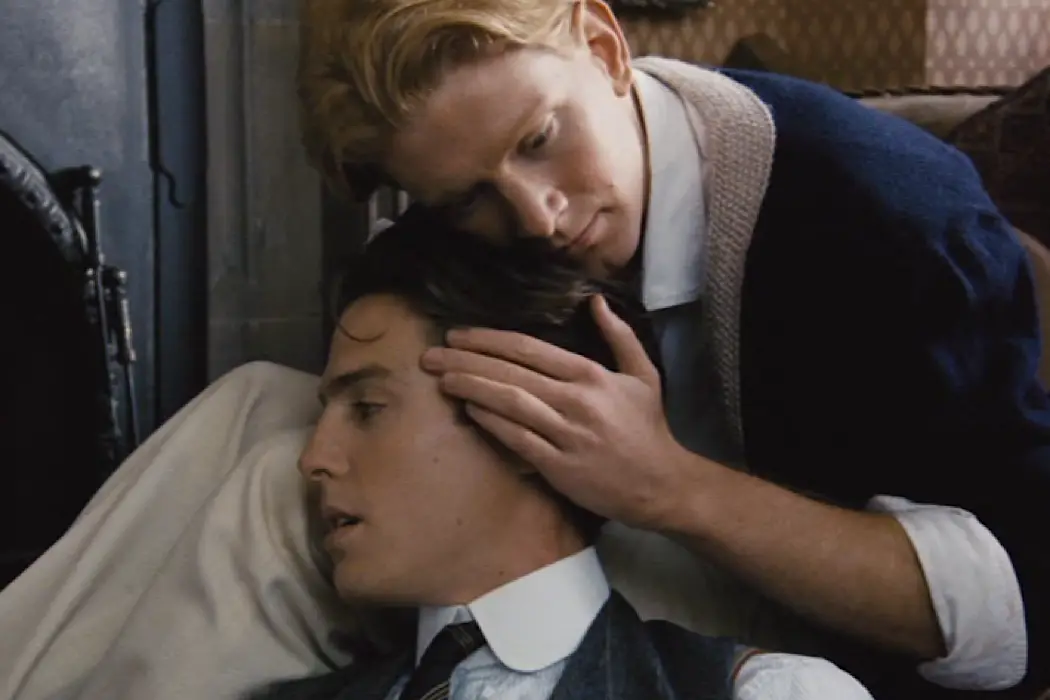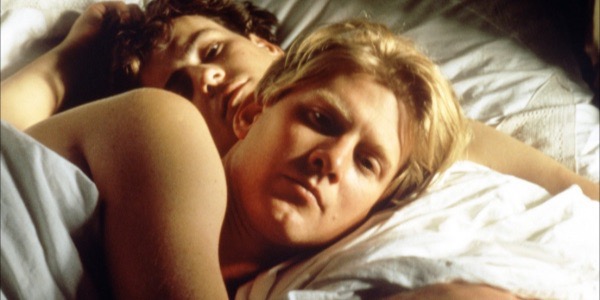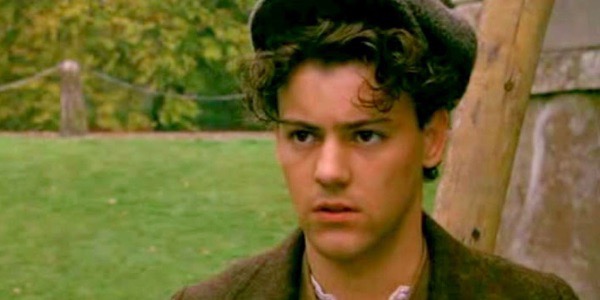Queerly Ever After #32: MAURICE (1987)

Amanda Jane Stern is an actress, writer, and director from…
Queerly Ever After is a bi-monthly column where I take a look at LGBT+ films that gave their characters a romantic happily-ever-after. There will be spoilers.
Two years after the first British film to depict two men kissing in a positive light, My Beautiful Laundrette, came out to critical acclaim, business and romantic partners Ismael Merchant and James Ivory released an adaptation of E.M. Forster’s posthumously published gay romance, Maurice. The story, set in early twentieth-century England, follows Maurice Hall (James Wilby) from his days at Cambridge University through his young adulthood and charts his different romances, first with the upper-class Clive Durham (Hugh Grant) and then the lower-class Alec Scudder (Rupert Graves). Throughout the 1980s Merchant and Ivory made a slew of period films adapted from Forster novels, usually to great acclaim, upon its release, Maurice did not fare as well as previous Merchant Ivory films. Despite that, it has gone on to be considered a classic film.
The Cambridge Years
The first third of the film is devoted to Maurice’s time as a student at Cambridge University. One night while going to visit another student, Risley (Mark Tandy), he runs into the charming Clive Durham. The two develop a tight friendship almost immediately. Soon Clive recognizes a sort of kinship in Maurice and professes his love to him. Initially, Maurice rejects Clive’s advances but soon realizes that he is in fact in love with him. One night, as Clive turns about in bed, Maurice climbs in through Clive’s window and professes his love as well. Thus begins the first love story of Maurice’s life, a love that will span years, but will remain unconsummated.

In early twentieth-century England, homosexuality was still criminalized; in fact, it wasn’t decriminalized until 1967. So Maurice and Clive have to continuously work to hide the true nature of their relationship. While Maurice is more willing to take risks and longs for physical contact with Clive, Clive insists that they must remain chaste with each other, or else they would sully the purity of their relationship. Clive’s own internalized homophobia and extreme repression only grow throughout the film. This is not Grant’s only time playing a self-loathing gay man, he also played real-life politician Jeremy Thorpe, who tried to have his lover murdered rather than be outed in the Amazon miniseries A Very English Scandal, which was directed by Stephen Frears (who also directed My Beautiful Laundrette).
Post-University
After Maurice leaves Cambridge early to become a stockbroker, he and Clive continue their relationship through writing and frequent visits to each other’s homes. As they continue to age, Maurice wants more from Clive, but Clive continues to pull away. Finally, when it is reported that their friend Risley, now a Lord, has been arrested for homosexuality, Clive can no longer handle their relationship. He breaks it off with Maurice and marries Anne Wood (Phoebe Nicholls), a woman he met while traveling in Greece.

Although the romantic nature of Maurice and Clive’s relationship has ended, the two remain, friends, albeit not as close as before, but Maurice still goes to visit Clive’s home frequently. It is during those visits that he meets the Durham’s under-gamekeeper, Alec Scudder. Scudder is a couple of years Maurice’s junior, and though uneducated due to his class status, he is not unintelligent. He is also a complete contrast to the repressed Clive. Where Clive was unwilling to take their relationship to a physical level due to his own fears, Scudder is unashamed to sleep with Maurice. And, one night while Maurice is staying over at Clive’s, in a scene that parallels how Maurice professed his love for Clive earlier in the film, Scudder climbs in through Maurice’s window, and the two spend the night together.
The Open Bisexual
One of the most fascinating things about Maurice is that Scudder is bisexual. This fact is made explicit in the novel (to which the movie sticks almost completely), however, scenes that made his bisexuality more explicit in the film were cut for time, and instead, it is only referenced once. In one scene in the book, Scudder tells Maurice that his brother has gotten him a job in Buenos Aires so he will be leaving England, maybe in Buenos Aires, he’ll get married. Maurice asks him how he can bear the charade of pretending to be straight, and Scudder responds it wouldn’t be a charade, he’s been in love with both women and men.
This only serves to place Scudder as even more of a contrast to Clive. Where Clive’s marriage to Anne is a sham designed to hide his true sexuality at the cost of his own happiness, Scudder actually has the ability to fall in love with a woman and yet, at the end of the movie chooses to risk it all to spend the rest of his life with Maurice. Where Clive is a coward, Scudder is willing to risk it all to be with whom he loves, even though he knows choosing to be with Maurice means life will be even more difficult, he believes that risk is worth it because Maurice is the person with whom he wants to spend his life.

It is also worth pointing out that Rupert Graves, who plays Scudder, has taken on roles in many LGBTQ+ themed films. While other actors, both LGBTQ+ and not, have shied away from doing more than one queer-themed film, Graves has embraced them. Not only has he embraced queer films, and theater, but he has also been incredibly open about his own sexuality in interviews. Many other actors have toed the line of pandering to the LGBTQ+ community, while also keeping quiet about their own possible queerness, but Graves has in multiple interviews discussed his past relationships with men, and while he veers more straight, he has been attracted to and in relationships with men in the past.
The Real Maurice and Scudder
As I previously mentioned, the film is almost a scene-for-scene adaptation of the Forster novel. Aside from changing a couple of minor details, and cutting a couple of scenes for time, the film is an incredibly faithful version of the story. No discussion of Maurice would be complete without also touching on the real-life couple who inspired Forster to write it. Forster, who was gay and open about his sexuality to his friends – but not the general public – wanted to write a gay love story that didn’t end in tragedy. The characters of Maurice Hall and Alec Scudder were inspired by his friends, the upper-class poet Edward Carpenter and his partner, the working-class George Merrill. Despite their vastly different class and education statuses, Carpenter and Merrill met one day while traveling in 1891, fell in love, and spent the rest of their lives together. Despite English attitudes and laws towards homosexuality at that time, Carpenter and Merrill lived openly as a couple.
In Conclusion: Maurice
The Merchant-Ivory film Maurice is an epic romance that spans years. It is also a period piece about a gay man that ends not in tragedy, but with a romantic happily ever after. With a stellar cast and the beautiful cinematography, a benchmark of the Merchant Ivory productions, on full display, Maurice is well worth the watch, and also, be sure to read the book.
Maurice came out September 18, 1987 in the USA and November 6, 1987 in the UK. For all other release dates, see here.
Watch Maurice
Does content like this matter to you?
Become a Member and support film journalism. Unlock access to all of Film Inquiry`s great articles. Join a community of like-minded readers who are passionate about cinema - get access to our private members Network, give back to independent filmmakers, and more.
Amanda Jane Stern is an actress, writer, and director from New York City. She received her BA in Film, Television & Interactive Media and Theater Arts from Brandeis University. She loves regaling whomever will listen with her endless lists of fun facts and knowledge of film history. Follow her on twitter and instagram @amandajanestern












